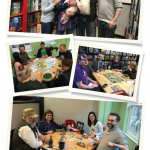
Image Credit: Sergey Peterman/shutterstock.com
James K. Smith, MD, believes in thinking several moves ahead. Consider your opponent. Gauge your strategy. Be aggressive when you need to be. Those are key aspects of his philosophy in rheumatology—and chess.
Initiation
Dr. Smith’s love of chess started after he had started his family. “I first got involved in the game through my daughter,” he says. “I coached her, along with a local master-level chess player. She ended up as the K–4 level Oregon state champion. Although she quickly lost interest in chess, I was hooked. I continued to take lessons from the same master. I started entering adult tournaments. He would critique my matches. We developed strategies and training programs, so that I would gradually improve.”
He found the competition invigorating, albeit sometimes a little frustrating when he thought his play could be better. “I had many upset victories over higher-rated players, and I had the ability to challenge players way above my level,” he says. “I was not very consistent, and I lost matches that I should have won, so my rating never got very high. I really enjoyed the intense competition and drama of tournament play. I would also follow the matches of the elite players. Like any good doctor, I enjoyed studying the game and improving my understanding of underlying principles of excellent play.”
Dr. Smith says he found chess made him a better rheumatologist. “Chess and medicine have a great deal in common,” he says. “Frequently, there is no right or wrong move, but some moves or decisions may be ‘stronger’ than others. Each move or decision will simultaneously lead to an improvement and a weakness. It is up to the doctor or player to decide if the improvement is worth the cost of the weakness. This is certainly the case in rheumatology. A new biologic agent will certainly lead to better control of rheumatoid arthritis, but at the cost of higher risk of infection. The modern rheumatologist needs to be well acquainted with registry data and evidence-based medicine. The patient also needs to be brought into this complex decision process.”

Dr. Smith
Dr. Smith chose rheumatology as his specialty when he worked in New York City at Metropolitan Hospital, where he gained an appreciation for preventive medicine and managing a patient over the long term. Assessing where the discipline was in the 1980s, he was fond of the emphasis on a good history and physical exam as opposed to labs and imaging.
Change of Scenery
Dr. Smith, who made a somewhat recent move to the University of Alabama-Birmingham School of Medicine after 17 years with Northwest Rheumatology Associates in Portland, Ore., starts his day by considering the patients he will see. He sees a good amount of new patients, spending extra time with them. A main tenet of his philosophy? Be readily armed with knowledge for them.
“I find you get [patients] on your side when you give them a strong sense of why you’re doing what you’re doing,” he says. “A computer terminal isn’t just for data entry. It can be an educational tool. I can show them their problems in an organized fashion and show them how I make decisions. I can also direct them to the best education websites.”
He also believes in taking the time to understand who they are. “You need to assess a patient for what they need when it comes to communication,” he says. “You need to see whether they’re cautious, just need the facts or really need a deeper emotional support. Understand what they need—don’t box all patients together.”
A computer terminal isn’t just for data entry. It can be an educational tool. I can show them their problems in an organized fashion & show [them] how I make decisions.
His goal as part of the Department of Medicine, Division of Clinical Immunology and Rheumatology, beyond building strong relationships with patients, is to also get different kinds of medical experts together to collaborate on projects. “I’m interested in contributing to the development of exercise routines for middle-aged and older athletes with osteoarthritis,” he says. “I’m also interested in collaborating in the care of patients with complex diseases, like Crohn’s disease; severe skin disorders; and interstitial lung disease. I like working with physicians from other fields, [such as] GI, pulmonary and dermatology. Recently, I have become involved with a chronic pain work group, which includes PhDs in neuroscience and physicians specializing in palliative care and addiction.”
Camaraderie
Dr. Smith hopes to see himself back in chess tournaments as time goes on, lately not having had a chance to be a part of the game in that arena. “Another great part of chess is meeting folks from different countries and backgrounds and sharing a common interest,” he says. “I also like meeting younger people. I am in my 50s, but I have to admit that I still feel like a teen at heart.
“I like this aspect of the large rheumatology meetings and working at an academic medical center. It’s fun to hang out with young doctors and get to know their point of view.
“It also keeps me optimistic about the future of medicine.”
Eric Butterman is a Texas-based freelance writer. Contact him via e-mail at [email protected].


